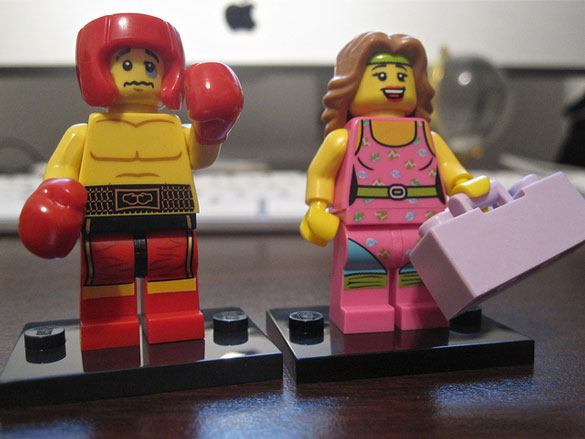"What type of clients do you want to train?" I ask, already knowing the answer.
"My passion is in sports, so I want to train athletes," says the young and ambitious trainer. "And by the way, I'm not a trainer. I'm a strength coach."
What I want to ask, but don't: "So why the hell are you training in a boutique studio that caters to general-population clients?"
I've trained hockey players for the NHL draft, football players for college, a mogul skier for the national team, and an LPGA golfer. Does this make me a strength coach? No. I've also trained celebrities. Does this make me a celebrity trainer? No.
At the time I wrote this, I was a personal trainer and damn proud of it. While I was fortunate to work with elite athletes, I made my living training regular people. Lots of high-performance coaches I know will tell you the same.
If nothing else, as Dean Somerset points out here, simple math makes it unlikely that any trainer will work with high-performance athletes exclusively. There aren't enough athletes to go around, and their availability is limited by their seasons and class schedules, if they're in school.
The truth is, all strength coaches are personal trainers.
Unless you work full-time for a team or institution as a strength and conditioning coach, you're a personal trainer. If you work at a commercial gym or private studio, and you pay your bills by training executives, retirees, and/or stay-at-home moms, you're a personal trainer.
If you don't want to train people with typical goals like fat loss or muscle gain, you're better off applying for internships with colleges or facilities that focus exclusively on high-performance clients. Working for a gym is not the path to a career training athletes.
There's nothing wrong with personal training
It's become a point of pride to call yourself as a "strength coach" instead of a personal trainer.
I understand why. Countless studies, blog posts, videos, podcasts, textbooks, and seminars focus on the newest and most innovative ways to train and feed competitive athletes. It's easy to convince yourself that training regular folks with regular goals is unimportant. And if your work is unimportant, what does that make you?
But how many people can you help by teaching them how to do a muscle-up on gymnastics rings, or an Olympic snatch? How much money can you make by training people who are ready to learn those things? Compare that to how many people want to look, feel, and move better, and how much money you make by helping them achieve those goals.
This is personal training. You're a service provider first and performance coach second.
Personal trainers must take untrained and sometimes unmotivated people and get them to follow your training program. The back cover of my first book, Ignite the Fire, explains this point:
"Personal Trainers are now expected to be salespeople, psychologists, nutritionists, post-rehabilitation specialists, and motivational speakers. You can have all the training expertise in the world, but you must also be able to inspire passion in your clients, and develop relationships with the people you serve"
A personal trainer's job is to figure out the best ways to help your client reach their goals. High performance is almost never their number-one priority. And, despite what you may think from their reputations and social media, even some of the top "strength coaches" make most of their money from personal training.
So what the hell is a strength coach anyway?
Personal training is unregulated. So is strength and conditioning. Anybody can call themselves whatever they want. If you want a career training athletes, don't work in a gym; you're better off seeking out opportunities to work with that population.
If you do work in a gym, while you may train some athletes, you'll make your money training the average Joe or Jane. Take pride in calling yourself a personal trainer, and give your clients a service they'll remember.










